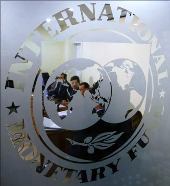 At a time when Indian corporates are keenly awaiting final guidelines for their entry into commercial banking, multilateral agency IMF has cautioned that risks related to allowing industrial houses to promote or own banks might 'outweigh' the benefits.
At a time when Indian corporates are keenly awaiting final guidelines for their entry into commercial banking, multilateral agency IMF has cautioned that risks related to allowing industrial houses to promote or own banks might 'outweigh' the benefits.
The International Monetary Fund has said that it would be prudent to gain sufficient experience by implementing a comprehensive framework before deciding on the entry of 'mixed groups and conglomerates' into commercial banking.
"In the current context, the risks may outweigh the benefits. . . The legal, operational, and regulatory framework for consolidated supervision of both bank-led groups and financial conglomerates is still missing some important elements," IMF said in its report -- India: Financial System Stability Assessment Update.
The report, released on January 15, comes at a time when the Reserve Bank of India is expected to soon come out with final guidelines for new bank licences.
A number of large corporate houses, including Anil Ambani-led Reliance Group, Religare, Shriram, L&T and Aditya Birla group, are reportedly interested in entering the banking business.
IMF has noted that it would be prudent to first put in place and gain sufficient experience from implementing a comprehensive framework for this
It said the international experience has supported the prudent policy position of disallowing industrial houses from promoting and owning banks.
According to the IMF, consolidated supervision frameworks and capabilities are weak even for bank led groups in the majority of jurisdictions assessed under the Financial Sector Assessment Programme and frameworks for the oversight of financial conglomerates continue to be a work in progress at the international level.
"Even greater complexity is introduced in supervisory frameworks when a significant part of the group is engaged in non-financial activity, the risks of which are not well captured by current supervisory frameworks.
This may lead to concerns of 'under the radar' risk transfer; concentration of risk exposures; and contagion across the group," it said.
In 2011, guidelines were issued for a new window of bank licences to foster competition, reduce costs, improve services and promote financial inclusion.
IMF said that while several elements of the 2003 policy have been retained, entry requirements have been raised.
"The key difference with past policy is the express eligibility of large industrial houses to promote new banks; or to convert NBFCs they own into new banks," it noted.











 © 2025
© 2025